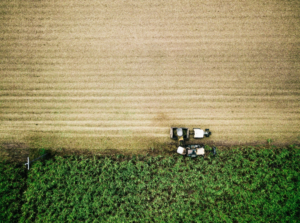With South Africa being a water-scarce country, widespread adoption of climate-smart farming practices requires concerted efforts to educate and support farmers, particularly small-scale producers, says SRK Consulting.
Over 60% of water use in the country is accounted for by farm irrigation, so it is imperative that water management is at the forefront of agricultural practices. “Initiatives such as water stewardship, modelling and planning are capable of empowering farmers to adapt to changing climatic conditions while safeguarding environmental integrity,” explains SRK principal scientist Fiona Sutton.
Water resource hydrological and yield modelling involves the use of mathematical and computational models to simulate the movement, distribution and availability of water in a specific area.
For example, the yield of a dam is defined as the maximum amount of water that it can supply without failing or emptying. Yield analyses are essential in the construction of dams and the development of operating rules for water supply systems, whether these are independent dams or interconnected water systems.
Having accurate and in-depth hydrological data – most notably streamflow and rainfall data – is key to accurate modelling. This data must reflect the situation on the ground over a given historic period, allowing the model to accurately predict the rainfall response of the catchment.
“Initiatives such as water stewardship, modelling and planning are capable of empowering farmers to adapt to changing climatic conditions while safeguarding environmental integrity,” explains SRK principal scientist Fiona Sutton.
Water resource hydrological and yield modelling involves the use of mathematical and computational models to simulate the movement, distribution and availability of water in a specific area.
For example, the yield of a dam is defined as the maximum amount of water that it can supply without failing or emptying. Yield analyses are essential in the construction of dams and the development of operating rules for water supply systems, whether these are independent dams or interconnected water systems.
Having accurate and in-depth hydrological data – most notably streamflow and rainfall data – is key to accurate modelling. This data must reflect the situation on the ground over a given historic period, allowing the model to accurately predict the rainfall response of the catchment.
 “Collaborative efforts among small-scale farmers, particularly in the form of cooperatives, points to a promising trend in agricultural resilience-building,” says SRK principal scientist and partner Wouter Jordaan. “By pooling resources and expertise, these groups are better equipped to tackle challenges such as water scarcity and climate variability.”
In addressing climate change and its effects on agricultural productivity and soil health, it is crucial to recognise the diverse impacts across different regions and crops. “We’re witnessing a shift from too much water in some areas to too little in others, and even issues of water quality,” notes SRK principal scientist and partner Philippa Burmeister.
“Collaborative efforts among small-scale farmers, particularly in the form of cooperatives, points to a promising trend in agricultural resilience-building,” says SRK principal scientist and partner Wouter Jordaan. “By pooling resources and expertise, these groups are better equipped to tackle challenges such as water scarcity and climate variability.”
In addressing climate change and its effects on agricultural productivity and soil health, it is crucial to recognise the diverse impacts across different regions and crops. “We’re witnessing a shift from too much water in some areas to too little in others, and even issues of water quality,” notes SRK principal scientist and partner Philippa Burmeister.The Western Cape, for example, has been grappling with a decline in mean annual rainfall, exacerbating concerns over water scarcity and soil degradation. In areas like KwaZulu-Natal too, where rainfall patterns are shifting, adaptive strategies are imperative.
According to Jordaan these regional disparities necessitate tailored approaches to mitigate the impacts on agricultural productivity. “By cultivating a variety of crops with differing water requirements, farmers can hedge against the risks associated with erratic rainfall patterns,” says Jordaan. “Additionally, embracing climate-smart agricultural practices, such as precision irrigation and soil conservation techniques, can enhance resilience to climatic uncertainties.” Burmeister points out that effective solutions must be context-specific and grounded in a deep understanding of the local environment – rotational cropping being a prime example.
“By integrating crops like cotton into sugarcane farming systems, farmers not only diversify their income streams but also improve soil health and reduce the need for synthetic fertilisers,” says Jordaan.
Moreover, addressing the issue of water quality is paramount, according to Sutton. “Ensuring that water is clean and free from contaminants is essential for safeguarding both agricultural productivity and environmental health,” she says.
Drip irrigation systems exemplify an innovative approach to water management in agriculture. By delivering water directly to the root zone of plants, these systems minimise wastage through evaporation and runoff.
“With precision agriculture, farmers can adjust irrigation schedules based on real-time data, optimising moisture levels for crops while conserving water,” concludes Sutton.
Burmeister points out that effective solutions must be context-specific and grounded in a deep understanding of the local environment – rotational cropping being a prime example.
“By integrating crops like cotton into sugarcane farming systems, farmers not only diversify their income streams but also improve soil health and reduce the need for synthetic fertilisers,” says Jordaan.
Moreover, addressing the issue of water quality is paramount, according to Sutton. “Ensuring that water is clean and free from contaminants is essential for safeguarding both agricultural productivity and environmental health,” she says.
Drip irrigation systems exemplify an innovative approach to water management in agriculture. By delivering water directly to the root zone of plants, these systems minimise wastage through evaporation and runoff.
“With precision agriculture, farmers can adjust irrigation schedules based on real-time data, optimising moisture levels for crops while conserving water,” concludes Sutton.







